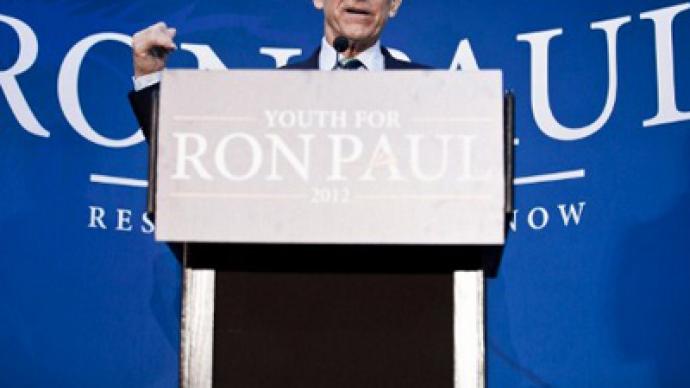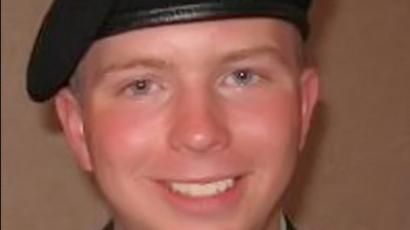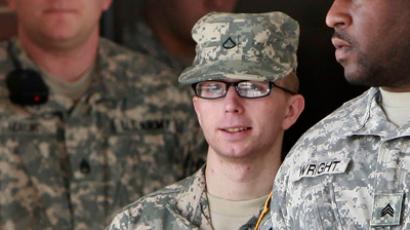Ron Paul says he'd protect Bradley Manning and other whistleblowers

As Bradley Manning awaits his next appearance in court, the pool of presidential candidates have been slow to comment on the prosecution against the US Army private accused of providing government secrets to WikiLeaks. Except for Ron Paul, that is.
President Barack Obama called Manning “guilty” even before he was brought to trial for his alleged role with WikiLeaks, but GOP presidential hopeful Texas Congressman Ron Paul told supporters last week that he thinks it isn’t quite as simple as that.Addressing supporters in San Antonio, Texas last week, Congressman Paul weighed in on the whistleblower’s role in bringing light to governmental scandal.At a campaign stop luncheon on Thursday, 36-year-old local Jonathan Streeter quizzed Rep. Paul for his take on the Manning incident:“I believe that open and transparent government is an important part in a government being accountable to the people, and indeed Obama made this same sort of promises and has obviously failed on that; The most visible example is Bradley manning and the WikiLeaks issue,” explained Streeter. “In your administration, what would you do to safeguard government transparency and specifically what would you do about Bradley Manning?”Before divulging an in-depth explanation, Congressman Paul was quick to cut to the chase. “I’d have him protected under the whistleblowers act,” explained the presidential hopeful.
Click here to watch video of Ron Paul discussing the Bradley Manning case
“I think this issue is a very important issue because I maintain that government becomes more secret and the people’s privacy is being destroyed. We should protect the people’s privacy and we should make the government much more open,” said Paul. “We can start with the Federal Reserve system.”Although President Obama campaigned on a platform of increased government transparency, the US government is currently in the process of taking PFC Bradley Manning to trial over his alleged contributions to Julian Assange’s WikiLeaks site. Accused of handing over top-secret military files, including the now infamous “Collateral Murder” video that shows US troops firing at civilians, Manning is being charged with aiding the enemy. Ron Paul argues that even if Manning did provide that footage for WikiLeaks, no one was impacted to the degree that the prosecution insists.“I imagine people ought to think it through, but from what I can do see from my viewpoint, is that his motivation had nothing to do with helping the enemy,” he said. According to the military prosecution, the video aided al-Qaeda in the Arabian Peninsula’s battle against US troops fighting overseas.“You know that if anybody had ever suffered a consequence because of the release of those thousands and thousands of pages, we would have heard about it by now,” added Paul.Before Manning was recommended for court-martial, his attorney David Coombs told authorities that White House officials described the leaked documents that landed Manning in prison as of a “rather benign nature” and as not “of any real damage to national security." In their own report last year, Wired explained that the Defense Intelligence Agency (DIA) “concluded that all of the information allegedly leaked was dated, represented low-level opinions or was already commonly known due to previous public disclosures."“Whistleblowers should be protected if they are telling the truth and they are not doing it for the purpose of being a traitor,” added the congressman. Bringing it into a historical prospective, Rep. Paul reminded the San Antonio crowd of Daniel Ellsberg, the former US Department of Defense employee that released what became known as the Pentagon Papers. By exposing the truth behind the government’s handling of the Vietnam War, Ellsberg is today often credited with helping end America’s involvement overseas in the early 1970's. At the time however, Paul said, others weren’t as understanding. “Daniel Ellsberg in the 60's, the early 70's I guess, was a traitor as far as the people were concerned,” said the congressman. “For me, he’s really a hero in the sense that we have good history now about Vietnam. Too bad we haven’t learned about what was going on, but his own remorse about this wasn’t that he did it. Ellsberg’s remorse was: why didn’t I do it sooner?”When RT caught up with Ellsberg during Manning’s pre-trial hearing, he described Manning as a personal “hero” of his.According to evidence submitted by the prosecution during a pre-trial hearing with Manning, the serviceman submitted evidence to an informant and insisted, "I was the source of the 12 July 07 video from the Apache Weapons Team which killed the two journalists and injured two kids.”"This is possibly one of the more significant documents of our time, removing the fog of war and revealing the true nature of 21st century asymmetric warfare. Have a good day,” is how the court claims Manning described the video.If that is the case, Ron Paul seems to be in Manning’s favor. “I would certainly lean in the direction of protecting people that are trying to tell the truth,” said the congressman. “The more openness the better. That’s what a free society is all about. It wouldn’t be so critical if the government was a lot smaller, but because it is so big it is big issue because there is so much that could be hidden.”Manning was arraigned on charges relating to his alleged involvement with WikiLeaks in February, nearly two years after being first detained by US officials. When prompted to offer a plea, Manning deferred doing so. Since then, his attorney has asked that the US government dismiss charges against Manning, citing mishandling on the part of the prosecution.














